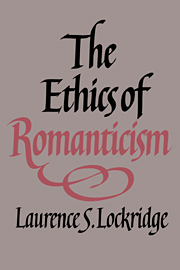Book contents
- Frontmatter
- Contents
- Acknowledgments
- Editions and abbreviations
- Introduction
- PART ONE THE WILL TO VALUE
- PART TWO AGENT, POWER, SCENE
- PART THREE THE PRESSURE OF REALITY
- 6 Shelley and the poetry of life
- 7 Hazlitt: common sense of a dissenter
- 8 Keats and the ethics of immanence
- 9 Byron: the world as glorious blunder
- 10 The ethical bearing of literature
- Select bibliography
- Index
8 - Keats and the ethics of immanence
Published online by Cambridge University Press: 16 September 2009
- Frontmatter
- Contents
- Acknowledgments
- Editions and abbreviations
- Introduction
- PART ONE THE WILL TO VALUE
- PART TWO AGENT, POWER, SCENE
- PART THREE THE PRESSURE OF REALITY
- 6 Shelley and the poetry of life
- 7 Hazlitt: common sense of a dissenter
- 8 Keats and the ethics of immanence
- 9 Byron: the world as glorious blunder
- 10 The ethical bearing of literature
- Select bibliography
- Index
Summary
Poetic onanism
Keats and Byron, ostensibly at odds as people and poets, share some tendencies significant in the context of Romantic ethics. Neither is much given to moral urging, unlike many of the visionary company. Each has a moral view of things but not one that yields precepts, or even more generalized recommendations as to the conduct of life. I have said something similar of Hazlitt, whose vigorous normative stance co-exists with recognition that people will go on being their sorry selves, whatever he might say. Keats and Byron share with him a habit of moral demystification, seen, for instance, in their restraint in prophecy. Unlike Blake's Bard, “Who Present, Past & Future sees / Whose ears have heard, / The Holy Word, / That walk'd among the ancient trees,” Keats does not presume imagination is possessed of prophetic power, and sees the doors of prophetic perception darkened by mist. In his rhetoric of denial, Byron pronounces all pages of human history the same. The Prophecy of Dante, an exception, soon proves a false prophecy. The dialectical view of history and personality found in Blake, Coleridge, and Shelley can be found in Keats's letters, but in the poetry he often constructs antinomies to arrest dialectical movement. Byron disallows dialectics altogether. Like Hazlitt, Byron and Keats might better be considered dialogic than dialectic.
Keats and Byron share a skeptical bent more pronounced – if not necessarily more profound – than that of the other Romantics.
- Type
- Chapter
- Information
- The Ethics of Romanticism , pp. 380 - 416Publisher: Cambridge University PressPrint publication year: 1989

